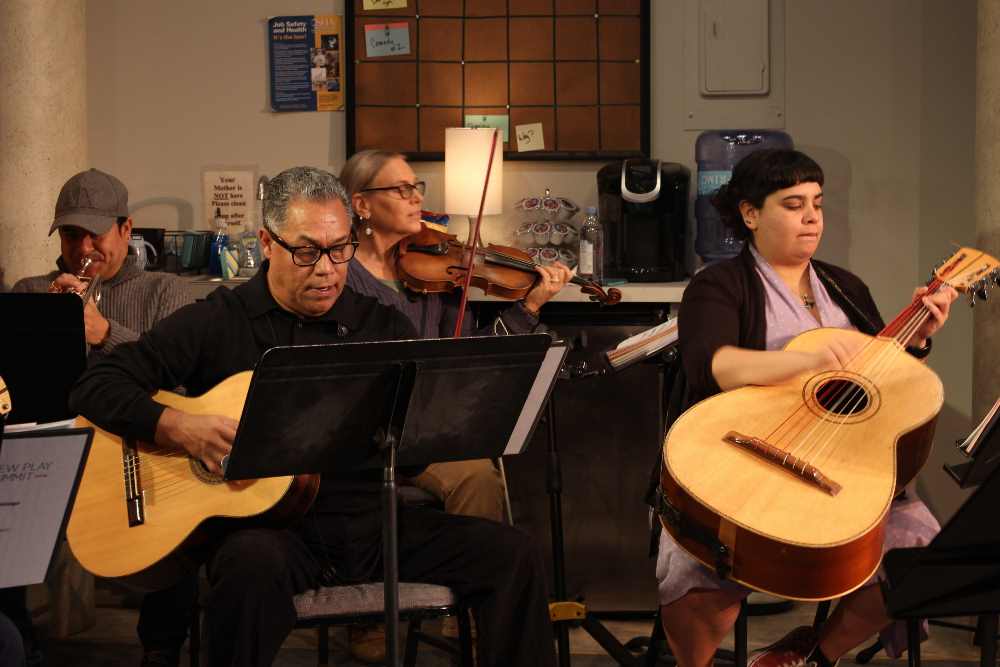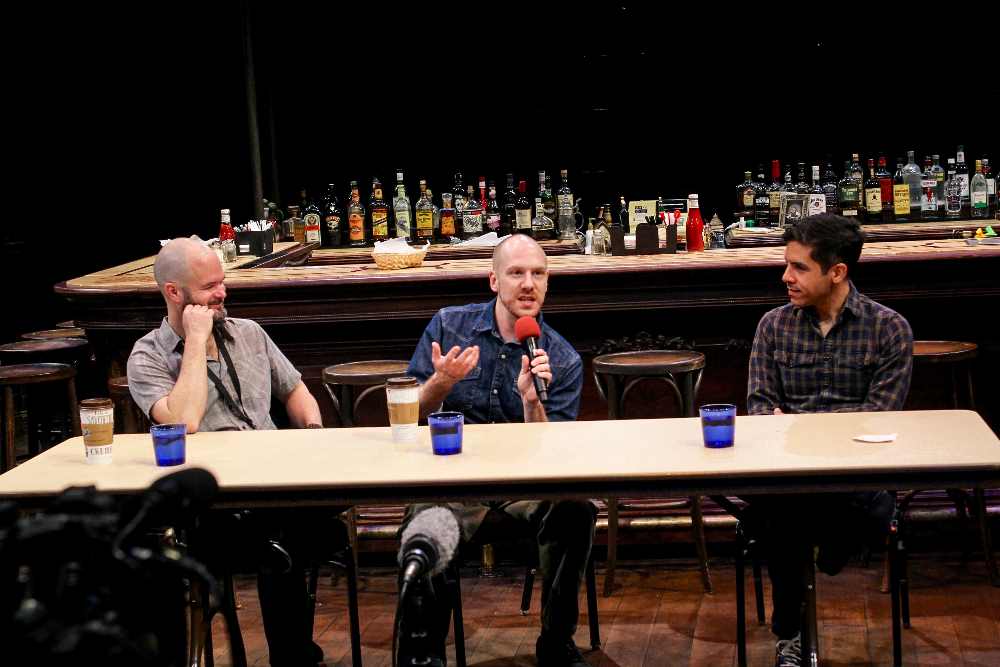DENVER: “No one works in theatre anymore; it’s television’s waiting room,” said playwright Matthew Lopez, reading from a new play. The audience responded with groans and jeers. “Oh, come on!” Lopez exclaimed with a laugh. “It’s my characters, okay?”
Lopez was seated on the edge of a table in the middle of the 200-seat Jones Theatre at the Denver Center for the Performing Arts. It was 10 p.m. and he was both participating in and hosting the Playwrights Slam, where commissioned writers of the DCPA’s Theatre Company read works in progress. Lauren Yee, Robert Schenkkan, Regina Taylor, and Andrew Hinderaker all took turns reading, and judging from the amount of applause, in this room theatre was the main event, not TV’s second fiddle.
The event was part of the Colorado New Play Summit, which was held Feb 13–14 and Feb 19–21. Founded in 2006 by DCPA Theatre Company’s producing artistic director, Kent Thompson, the Summit has presented a total of 48 plays in its 11 years, and more than half have subsequently been produced at the company. These have included Our House by Theresa Rebeck, The House of the Spirits by Caridad Svich, Lopez’s The Legend of Georgia McBride , and The Whale by Samuel D. Hunter.
“I would say the first year we had maybe 50 to 60 people here,” Thompson recalled. “It’s grown a lot in the sense that we feel like we’re connected to a huge circle of theatre around the country now. They may not come every year, but they come regularly.” Indeed, this year’s Summit sold a total of 2,500 tickets to the various readings, with attendees coming from 27 states.
Before 2015, the Summit only lasted one weekend, following the typical new-play festival model of giving playwrights a week of rehearsal before a public workshop. But the event expanded to two weekends last year, allowing more audience members and theatre professionals to see the plays, and giving the playwrights more time for development and revisions.
“It is rare to get two full weeks of rehearsal in a workshop like the Summit provides,” playwright Mat Smart wrote via email. Smart’s play Midwinter was part of this year’s Summit. “I hardly slept, drank way too much coffee, and made the most of it,” he said. “I had a second draft when we started, and now I feel like I have a draft that’s ready to go into rehearsal for a production.”
The other plays this year were American Mariachi by José Cruz González, The Book of Will by Lauren Gunderson, and Two Degrees by Tira Palmquist. Each year a few Summit plays are promoted to full productions in the following season; this year The Nest by Theresa Rebeck (Jan. 22–Feb. 21) and FADE by Tanya Saracho (Feb. 5–March 13) came from readings at the 2015 Summit. This year’s event also included a public workshop of Sweet & Lucky, an immersive experience commissioned from Brooklyn-based dance-theatre company Third Rail Projects. The show will begin performances in May.
Though Thompson doesn’t have a formula for how he selects work, he’s always looking for diversity, in more senses than one. “Diversity for me is definitely about race and culture, and it’s definitely about gender,” he said. “But it’s also age. It’s also about what’s adventurous and adventuresome, what haven’t we seen before, and of course, what’s incredible writing.”

“To be, or not to be?”
Lauren Gunderson’s Book of Will takes its first line from the play about the Prince of Denmark and includes an atypical sight: a black actor playing Hamlet. And he’s not performing the role in a modern or fantasy setting. Gunderson’s play is a period dramedy chronicling the construction of Shakespeare’s First Folio. Gunderson referred to the 10-person cast as a “United Colors of Benetton ad,” with actors of Egyptian, Indian, and Latino descent, as well as black and white.
“Shakespeare is for everyone, so I thought a play about Shakespeare should be for everyone, with everyone too,” Gunderson explained. “We got some great feedback from audience members: a bunch who specifically said they appreciate the diversity and who said they noticed it, but it didn’t take them out of the play. I think if people are worried about that, that’s not quite crediting your audience with much sophistication.”
Diversity in casting wasn’t just limited to Gunderson. Actors of color also played pivotal roles in Two Degrees, Midwinter, and in the all-Latino/a American Mariachi. Two Degrees also featured leading roles for women over the age of 40, an underserved population of actors.
“You rarely come across that many plays that feature layered characters of people who are over 45-50,” said director of new play development Bruce K. Sevy. “There are these amazing actresses who get so good, and then their choices turn into moms or neighbor ladies. It’s amazing how few really great contemporary roles there are for women of that age.”
This year there was diversity among the creative teams as well; when the entire Summit team gathered on the first day, the demographic made an impression on González. “As I was sitting there, I looked around the room and thought, ‘Wow this is pretty impressive,’” he recalled. “You had two Latino directors [Nicholas C. Avila and Jaime Castañeda] that were working on non-Latino pieces. And then me with Rachel Bowditch, Shirley Fishman, and Cynthia Reifler Flores, all white women, working on a Latino play…That was pretty awesome.”
The plays ranged in topics from Shakespeare to an all-female mariachi band (American Mariachi) to a climate change scientist testifying in a Congressional hearing (Two Degrees) to a group of workers stuck in a research center in Antarctica (Midwinter). And those were just the readings. The full productions were set in a bar (The Nest) and a Hollywood TV writer’s office (FADE).
The two plays from this year’s Summit that will graduate to full productions in 2016 are Gunderson’s Book of Will and Palmquist’s Two Degrees. (DCPA’s artistic staff will also shop the unselected plays to other theatres.) To Sevy, who estimated that DCPA receives more than 500 scripts annually for the event, it’s an embarrassment of riches.
“There’s so much good writing out there,” he enthused. “We could have a Summit festival that lasted an entire year. I would love it, frankly! I really believe these plays need to get produced and that playwrights get better when we produce them.”

“There’s a theory that says when you remember something, you’re actually recalling the last time you remembered it,” an actor said to me. It’s a profound statement. And it isn’t from an interview. In fact, it’s part of a show. On Sunday morning, the last day of the Summit, Third Rail Projects was presenting an hour-long workshop of their newest immersive piece, Sweet & Lucky.
New-play devotees know what to expect when you hear the phrase “new-play festival” or “development.” You go into a room where you see music stands and actors with scripts in their hands. But what happens when the work you want to produce can’t be workshopped using music stands?
Those are the questions DCPA pondered when the company commissioned an immersive, site-specific work from Third Rail, and told them they should get a workshop showing ready in time for the second weekend of the Summit.
“It actually requires the amount of resources it would normally take to put up a show to do a showing and a concept draft of some of this stuff,” said Third Rail co-artistic director Zach Morris. That’s because the presentation contained props (including multiple caskets and furniture for the performers to dance on), audio headsets for each audience member, and curtains (so many curtains) that partitioned the rehearsal hall into different environments for audience members to walk through. The audience began in groups of nine, and every person received a one-on-one interaction with an actor. For anyone who saw Third Rail’s long-running Alice’s Adventures in Wonderland–inspired hit Then She Fell in Brooklyn, it was that type of experience, but with the performers wearing sweats and tennis shoes instead of costumes.
“This type of work isn’t often represented in those traditional developmental forms,” Morris said, but for a small, independent ensemble like Third Rail, to work with a large producer like DCPA, “it was like Christmas every day.” The other artists in the festival expressed the same sentiment; it was that sense of freedom (and the company’s bigger budget) that allowed Gunderson to write a 10-person play and for González to request the theatre purchase two violins for American Mariachi.
And in a climate where audiences are more game for nontraditional theatrical experiences, DCPA and Third Rail showcased a way resident theatres can workshop experimental work.
“It was really, really important to model this sort of collaboration, because I think there are a bunch of presenters and producers who want to support this type of work,” said Morris. “And I think there are a lot of artists who need that support if this type of work is going to be able to access the years of resources and expertise that’s inherent in some of our finest national theatres. I think DCPA has done a really amazing job of thinking outside the box in all of their presenting structures, and also being flexible and fluid in the conversations with us.”
It’s another example of how Thompson is constantly thinking ahead with the New Play Summit. After all, he was the one who started the event and turned Denver into a must-see destination for new plays. He has also been a prominent advocate for gender parity in programming by starting the Women’s Voices Fund at DCPA; it’s now 11 years old and has an endowment of more than $1 million to commission and produce female playwrights. During our conversation, he repeatedly emphasized the need for the theatre to stay relevant by diversifying its programming on all fronts.
“Most [artistic directors] are wired to pick what they perceive are the most exciting projects,” Thompson said. “The question is, how hard do you look and how do you make sure you’ve got a good pipeline of diverse voices and artists? For me, it’s about the pipeline and how do you create a better pipeline, so that in 20 years, the theatre is moving to a new place, and it better reflects where we live now, and in the future.”


